Virtually everything in today’s society interfaces with computers. By necessity, tomorrow’s scientists and engineers will need to be very conversant with a wide range of computer related technologies. This class will focus on providing students with exposure to a many different technology applications via fun, hands-on projects involving programming, 3D modeling, 3D-printing, mobile application development, and other topics to support STEM skills.
Course materials will be available in Canvas that will cover the requirements for each project. The class time will be face-to-face. All materials required for this course will be provided for student use during the session.
Student Learning Outcomes
- Being able to demonstrate the ability to solve basic problems via computer algorithms
- Understanding logic structures
- Use of technology to solve computational
Course Requirements/Examinations
STEM Skills is a project based course. Each of the learning outcomes will be implemented via one or more projects. The course uses online tutorials to allow students to work at their own pace.
Examples of concepts and projects (but not limited to) as follows:
- Computational Thinking and computer algorithms: mobile/Tablet/Computer based app development
- Hardware and Logic problem solving: microboards/computer/breadboard project
- Computational problems and algorithms: CAD software/3D print design, Virtual Reality and other technologies
To be successful in this course the student should participate and complete all projects assigned. Projects will consist of an activity and a written reflection by the student. There will be from 3-5 projects for this course based on time.
Attendance is mandatory each day. One (1) point will be deducted from the final grade for each unexcused absence. The grading scale for this course is an ABC/NC. Each project will be graded on a 100 point scale. The average of all projects will be used to assign a final grade.
Credit Hours: 1
Course Instructors
 Dr. Lila Holt, Course Director
Dr. Lila Holt, Course Director
Dr. Lila Holt is a lecturer in the Department of Electrical Engineering and Computer Science. She also teaches as an Adjunct Assistant Professor in the College of Education. Her interests include finding ways to better use technologies for learning and for life. Rapid advancements in computers and technology create a need for adaptation for learning and for life skills. Her research covers using technology, including the web and multimedia, for effective communication for instruction and for work place excellence.